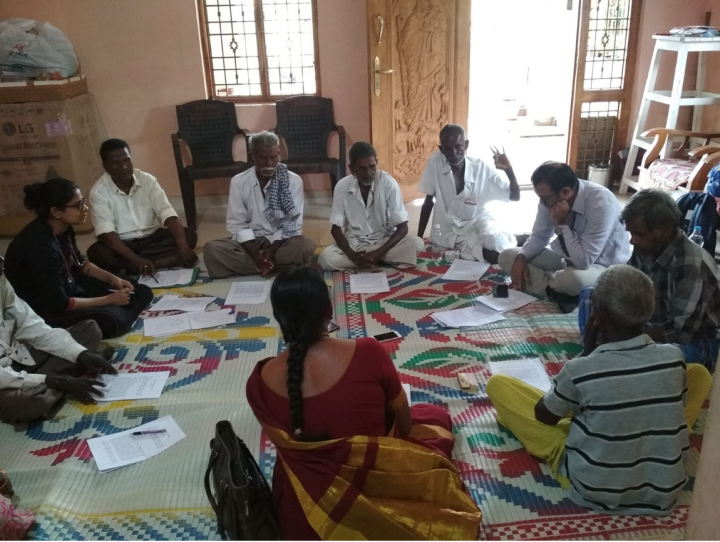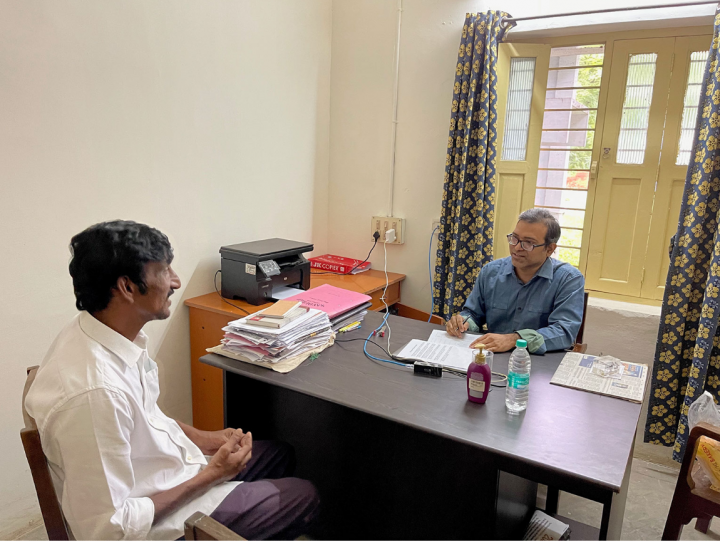Qualitative study explores the lived experience and attitudes towards chronic respiratory diseases in Vellore, India
Publication identifies chronic respiratory disease patients had gaps in understanding of causes, risk factors and long-term implications of their illnesses
A RESPIRE study, published in PLoS ONE, describes the input from a qualitative study around the lived experience of people with chronic respiratory disease (CRD) in a low-literate community in southern India. The information gathered shaped the development of an educational programme to reduce the burden of CRDs.
Chronic respiratory diseases in low- and middle-income countries
CRDs (including asthma, chronic obstructive pulmonary disease (COPD) or bronchiectasis) cause high numbers of deaths and illness globally, with a high proportion of cases seen in low- and middle-income countries (LMICs). This is a major challenge to public health in these regions, due to how frequent and how severe the diseases are. Additionally, there patient have limited knowledge around both the risky behaviours contributing to CRDs and how they can be treated.
This study, carried out by RESPIRE researchers, wanted to explore what people with CRDs in a rural community in southern India understood about the diseases and risk factors, as well as the community’s health behaviours. An educational intervention to change health behaviours was developed based on the evidence in this study.
The study

Before the study commenced, the team took time to engage with the community in order to strengthen relationships.
The study was conducted between September and December 2018 and recruits were adults over 18, both men and women who had been diagnosed with CRD living in Vellore. The qualitative research methods included focus group discussions, in-depth interviews and key informant interviews.
Analysis of the discussions and interviews identified three major themes.
Understanding of chronic lung disease and associated health behaviours
This theme explored participants’ perceptions of the disease condition and the health behaviour in practice.
Lived experiences with the disease
This second theme describes participants’ health experiences and social issues arising from the disease.
Social norms, attitude and other factors influencing health behaviour
The third theme provides insights into why people do what they do, influenced by societal norms, and how these behaviours can be changed to improve their health.
Results

The main findings indicate that the CRD patients in this study had gaps in understanding of what causes their illness, what risky behaviours can influence their illness, and what the long-term implications of their CRD are. This lack of understanding probably contributed to continued negative health behaviours, such as use of biomass fuels (like wood or coal), delaying seeking treatment, or irregular or infrequent use of inhalers.
Unrelated to understanding, the respondents’ circumstances dictate their health behaviours. Factors like financial constraints limited their use of gas in cooking, rather than using other fuels.
Social norms and cultural barriers restricted desired health behaviours. For example, the stigma of using inhalers in public, telling others about their illness, and the use of traditional remedies contributed to negative health behaviours.
Respondents’ experiences of health-related issues with their disease, stigma and social exclusion contributed to psychological issues, like depression. This also negatively affected their health behaviours. However, the participants usually had support from their family and a positive attitude towards their health.
Influencing interventions
The study helped the researchers identify gaps where intervention could be useful, and helped design the programme best suited to this local community. The intervention developed by the researchers based on these findings included culturally acceptable and easy to understand media and methods for improving awareness of CRD and related health behaviour. This was for not only patients but also the local community and caregivers.
The findings of this study helped identify that health behaviours are rooted in the local cultural practices and prevailing social norms. Lack of awareness of the disease and its long-term conditions, as well as social marginalisation, stigma and psychological effects further influence health behaviours.
Biswajit Paul, RESPIRE PhD student, was the lead author on this study. He believes the findings of this study could influence research in other low- and middle-income regions. He said:
This qualitative research gives a lot on how people with CRD behave and why they do so, with several limiting factors working in tandem in such resource-poor settings. This information is invaluable in designing interventions for behaviour change in such settings to make them effective and sustainable.
Read the paper
This publication is available from PLoS ONE
Cite as
Paul B, Isaac R, R. H, Jebaraj P, S. M, Das D, et al. (2021) Development of an educational intervention to reduce the burden of adult chronic lung disease in rural India: Inputs from a qualitative study. PLoS ONE 16(7): e0254534. DOI: 10.1371/journal.pone.0254534
This study is part of a wider RESPIRE project, based at Christian Medical College (CMC) Vellore in India.
Prevention, detection and treatment of adult lung disease
Find out about Biswajit’s PhD study
Image credit: CMC Vellore
All images taken between September and December 2018

